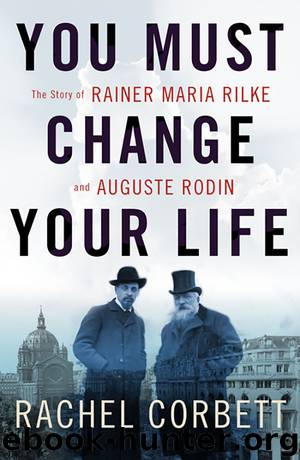You Must Change Your Life by Rachel Corbett

Author:Rachel Corbett
Language: eng
Format: epub
Publisher: W. W. Norton & Company
RILKE’S PATRON WAS NOT the only person becoming frustrated by the poet’s capricious and costly travels. Back in Berlin, Westhoff complained to her new friend Andreas-Salomé about Rilke’s prolonged absences. Their so-called “interior marriage,” based on letters and distance, had left her to raise Ruth alone, and she often barely scraped by on her teaching income.
Andreas-Salomé was horrified. She advised Westhoff to notify the police if Rilke did not begin fulfilling his paternal obligations soon. Westhoff must have known that the mere suggestion of legal action—particularly coming from his dear Lou—would humiliate Rilke, hopefully into compliance. She wrote to her husband to tell him what his friend had said.
As she expected, the letter detonated on Rilke’s Italian vacation. He wrote an impassioned defense to his wife and, in a roundabout way, to Andreas-Salomé, whom he knew would hear about it. He accused his old friend of hypocrisy, reminding them how Andreas-Salomé had always urged him to elevate his art above all external demands. Being a father was an honorable pursuit, but a poet’s calling was an imperative, he said, ignoring the fact that Andreas-Salomé’s actual advice was to not start a family at all.
Rilke pleaded with his wife for understanding and then he praised her. But he stuck to his resolve to pursue the prodigal path: “I will not give up my hazardous, so often irresponsible position and exchange it for a more explainable, more resigned post until the last, the ultimate, final voice has spoken to me,” he said.
It’s not that Rilke didn’t value love, he just preferred it as an intransitive verb: without object, like a radiating circle. Otherwise to love was to possess another, while to be loved was to be possessed. Or, as he would more pointedly put it in Malte, “To be loved means to be consumed in flames. To love is to give light with inexhaustible oil. To be loved is to pass away; to love is to endure.” To Rilke, the home’s hearth was the brightest-blazing fire and he would rather jump out a window than risk burning alive; if he fell flat, at least a scarred face was better than one that resembled somebody else’s. To Rilke, family was the ultimate annihilation of self.
He failed to see that his wife at least partly agreed—except that it was she who wanted to fulfill her calling. So while Rilke spent his Christmas in Capri, Westhoff made her way to Egypt, where some friends had offered her a few commissions and a place to stay while she worked. Rilke had not seen her so determined in years: “Since that first contact with Rodin she has not reached out for anything with so much need and real hunger as now.”
As he entered a fallow period in his own career, he was perhaps a bit envious of her industriousness, too. His trip to Italy had proved to be an utter mistake. There were too many distractions there: drunken German tourists thundered through town, while his hostess’s friends did too much socializing and too little work.
Download
This site does not store any files on its server. We only index and link to content provided by other sites. Please contact the content providers to delete copyright contents if any and email us, we'll remove relevant links or contents immediately.
Cecilia; Or, Memoirs of an Heiress — Volume 3 by Fanny Burney(30934)
Cecilia; Or, Memoirs of an Heiress — Volume 2 by Fanny Burney(30889)
Fanny Burney by Claire Harman(25784)
We're Going to Need More Wine by Gabrielle Union(18074)
Plagued by Fire by Paul Hendrickson(16637)
Cat's cradle by Kurt Vonnegut(13868)
Bombshells: Glamour Girls of a Lifetime by Sullivan Steve(13109)
All the Missing Girls by Megan Miranda(12752)
Leonardo da Vinci by Walter Isaacson(11903)
4 3 2 1: A Novel by Paul Auster(11052)
Adultolescence by Gabbie Hanna(8145)
The remains of the day by Kazuo Ishiguro(7551)
Note to Self by Connor Franta(7024)
Diary of a Player by Brad Paisley(6866)
Giovanni's Room by James Baldwin(5879)
What Does This Button Do? by Bruce Dickinson(5527)
Recovery by Russell Brand(4565)
Born a Crime by Trevor Noah(4511)
The Kite Runner by Khaled Hosseini(4437)
